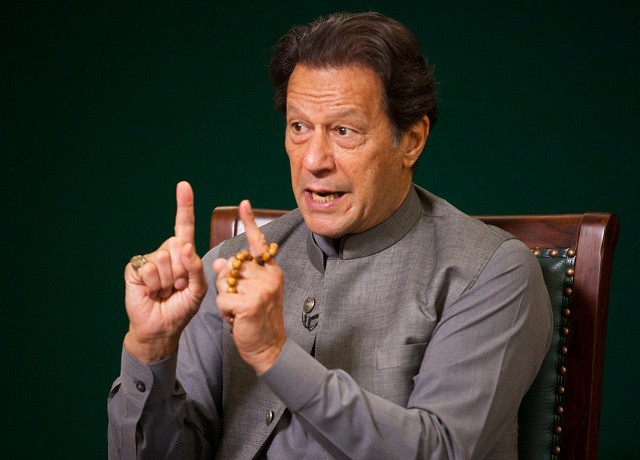
Despite disqualification in the Toshakhana reference case, PTI chief Imran Khan is still not legally barred from contesting in future elections and was allowed to run for A-45 (Kurram-I) by-election scheduled for October 30, ECP sources said on Tuesday.
A team of ECP consisting of members from its legal wing has declared the PTI chief eligible for the by-elections after reviewing the case thoroughly and has also informed the regional election commissioner of Kurram about the same.
The polls supervisory body greenlighted Imran’s decision to contest the by-polls comes after the regional election commissioner sought a legal opinion in view of the NA-45 Kurram by-election in the light of the disqualification decision.
The sources in the ECP’s law wing further explained that the former prime minister was only de-seated in the light of Article 63 (1) (p) of the Constitution and therefore, he could not be barred from contesting for polls.
It is pertinent to note that the Islamabad High Court (IHC) Chief Justice Athar Minallah on Monday had said that former prime minister Imran Khan’s disqualification by the Election Commission of Pakistan was only to the extent of the seat he was notified on.
The IHC CJ’s remarks came while hearing the Pakistan Tehreek-e-Insaf chief’s petition against the ECP’s decision to disqualify him in the Toshakhana reference.
Imran had approached the IHC, requesting it to declare the ECP’s decision null and void.
Justice Minallah maintained that Imran was only disqualified to the extent of the seat he was notified on. He furthered that there was no need to rush the process of hearing the plea and that the case would be heard once the verdict's certified copies were presented.
ECP challenges LHC's relief to Imran in contempt proceedings
Contempt proceedings
The ECP challenged the Lahore High Court's (LHC) interim order to suspend the show-cause notice against Pakistan Tehreek-e-Insaf (PTI) chief Imran Khan in the Supreme Court.
The petition prayed the court to suspend the LHC's interim order of September 21.
The petition stated that the electoral watchdog was a constitutional body, which has issued contempt notices to Imran Khan and PTI leaders Asad Umar and Fawad Chaudhary as per the law.
Read Islamabad long march to begin from Lahore on Friday: Imran
On September 2, the Rawalpindi bench of the LHC suspended the contempt notices to the PTI leaders by the ECP.
In its petition, the ECP pleaded with the top court to lift the stay order issued by the LHC and sought the court’s permission to carry forward the contempt proceedings against the PTI leaders.
The PTI chairman had submitted his reply to the ECP and admitted the institution’s right to conduct the contempt proceedings, read the petition.
Urging the top court to lift the LHC’s order, the ECP contended that the suspect could not challenge the electoral watchdog’s proceedings after submitting a written reply.
"The impugned order is illegal and unlawful having effectively suspended section 10 of the Elections Act, 2017 by restraining the petitioner ECP from taking ‘adverse action’," the petition contended and added that the Election Act, 2017 is primary legislation, and no provision of such enactment can be suspended in constitutional jurisdiction under Article 199. It is settled law that there exists a presumption of validity in favour of primary legislation and the enactment must be allowed to remain in operation until a declaration of invalidity is formally passed by the court.
"The fact that the impugned did not explicitly suspend a provision of law does not change the fact that the said order is illegal and unlawful, for it has been settled by the superior courts that actions barred from being done directly cannot be accomplished indirectly."
It contended that hat the high court's order by nullifying the powers of the ECP under section 10 of the Elections Act, 2017 by virtue of the restraining order has effectively granted "the final relief" to Imran.
It is settled law that no final relief can be granted at the interim stage when the court has not provided an opportunity of hearing to all the relevant parties to make their submissions and address the legal controversies, it stressed.
Read more Imran 'advised' Arshad Sharif to leave country amid death threats
The LHC's order, it continued, is "irregular being prima facie self-contradictory and ambiguous".
The ECP's petition stated that the order has had the "effect of undermining" the ECP’s authority and has effectively suspended section 10 of the Elections Act, 2017 not only with respect to Imran's case but any other person that commits contempt of the commission.
'Dangerous precedent'
The petition also argued that the LHC's order having been passed on the strength of injunctive relief granted in a separate writ petition has set "a dangerous precedent" suggesting that all notices/proceedings under section 10 of the Elections Act, 2017 are likewise liable to suspension.
"Undermining of public confidence in an independent constitutional body which is responsible for safeguarding democracy in the country, and effectively leaving it without the tools necessary to safeguard its integrity amounts to prejudicing and/or interfering in the carrying out of public work and is harmful to the public interest. The grant of this manner of injunctive relief is specifically barred by virtue of Article 199(4)(b) of the Constitution."
The LHC issued the stay order after the suspects assured the court that they would appear before the ECP, the petition read. Despite assuring the LHC, the suspects were not appearing before the ECP, it added.
Election Act 2017 empowers the ECP to conduct contempt proceedings, the electoral watchdog added.
On August 19, the ECP had issued notices to PTI Chairman Imran Khan and party leaders Fawad Chaudhry and Asad Umar for “contemptuous” remarks against the electoral watchdog. It accused Imran of levelling “baseless allegations” at the ECP and its chief in his addresses on July 18, 21, 27, August 4 and 10.



1719660634-1/BeFunky-collage-nicole-(1)1719660634-1-165x106.webp)

1732276540-0/kim-(10)1732276540-0-165x106.webp)


1724249382-0/Untitled-(640-x-480-px)1724249382-0-270x192.webp)


1732270499-0/Express-Tribune-(7)1732270499-0-270x192.webp)






COMMENTS
Comments are moderated and generally will be posted if they are on-topic and not abusive.
For more information, please see our Comments FAQ